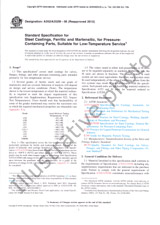We need your consent to use the individual data so that you can see information about your interests, among other things. Click "OK" to give your consent.
ASTM F2375-09(2017)
Standard Practice for Design, Manufacture, Installation and Testing of Climbing Nets and Netting/Mesh used in Amusement Rides, Devices, Play Areas and Attractions
Translate name
STANDARD published on 1.5.2017
The information about the standard:
Designation standards: ASTM F2375-09(2017)
Publication date standards: 1.5.2017
SKU: NS-688983
The number of pages: 13
Approximate weight : 39 g (0.09 lbs)
Country: American technical standard
Category: Technical standards ASTM
The category - similar standards:
Annotation of standard text ASTM F2375-09(2017) :
Keywords:
backer net, barrier net, climb net, debris net, mesh, net, netting, node, no-hold netting, safety net, web net,, ICS Number Code 97.200.40 (Playgrounds)
Additional information
| 1. Scope | ||||||||||||||||||||||||
|
1.1 This practice establishes performance specifications and performance standards for the design, manufacturing, and maintenance of netting and or mesh used in play areas and systems designed for interactive play activities within amusement attractions. 1.2 The range of users encompassed by this safety performance specification is 32 in. (0.81 m) (2 years old, 5th percentile) through 50 in. (1.27 m) (8 years old, 50th percentile), 50 in. (1.27 m) (8 years old, 50th percentile) through 64 in. (1.62 m) (12 years old 95th percentile), 32 in. (0.81 m) (2 years old, 5th percentile) through 64 in. (1.62 m) (12 years old, 95th percentile), and 64 in. (1.62 m) (12-year old, 95th percentile) through adult. 1.3 The ages listed in this standard are intended to be used as a guide for determining activities and use. The height requirements are the governing factor. 1.4 Home playground equipment, matrix nets, nets used as/or in fencing, sports equipment, fitness equipment, playground equipment covered by Consumer Safety Performance Specification F1487 and soft contained play equipment (SCPE) covered by Safety Performance Specification F1918 in areas not covered by F24 standards are not included in this standard. 1.5 This practice includes an appendix (non-mandatory), which provides additional information (for example, rationale, background, interpretations, drawings, commentary, and so forth.) to improve the user’s understanding and application of the criteria presented in this practice. The appendix information shall not be interpreted as mandatory design criteria. 1.6 This standard is intended for new climb areas and major modifications. 1.7 Existing climb areas may qualify as compliant for five years following the date of this publication of this practice as long as any significant design related failures or significant design related safety issues have been mitigated. Thereafter, climb areas must qualify as “Service Proven” per Practice F2291 or meet the requirements of this practice. 1.8 The values stated in inch-pound units are to be regarded as standard. The values given in parentheses are mathematical conversions to SI units that are provided for information only and are not considered standard. 1.9 This standard does not purport to address all of the safety concerns, if any, associated with its use. It is the responsibility of the user of this standard to establish appropriate safety and health practices and determine the applicability of regulatory limitations prior to use. 1.10 This international standard was developed in accordance with internationally recognized principles on standardization established in the Decision on Principles for the Development of International Standards, Guides and Recommendations issued by the World Trade Organization Technical Barriers to Trade (TBT) Committee. |
||||||||||||||||||||||||
| 2. Referenced Documents | ||||||||||||||||||||||||
|
We recommend:
Technical standards updating
Do you want to make sure you use only the valid technical standards?
We can offer you a solution which will provide you a monthly overview concerning the updating of standards which you use.
Would you like to know more? Look at this page.




 Cookies
Cookies
